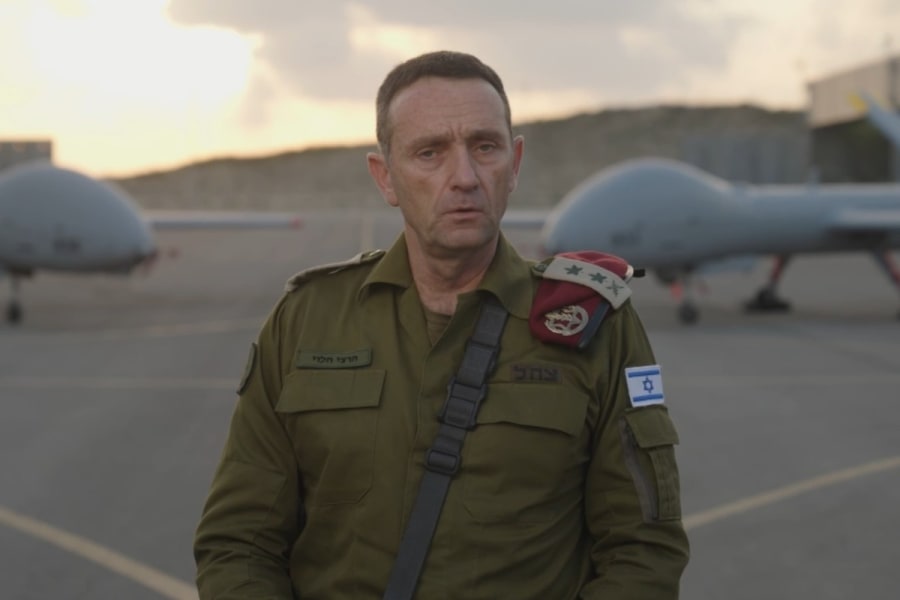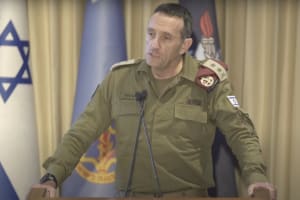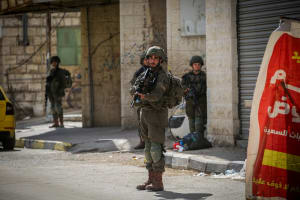IDF Chief Halevi: Returning the hostages a ‘moral imperative,’ IDF does everything to create conditions for a deal
Hamas trying to hide results of strike on Deif, Halevi says

In a wide-ranging statement delivered from the tarmac of Palmachim Air Base, IDF Chief of Staff Lt.-Gen. Herzi Halevi addressed several topics related to the war, including the hostage deal talks that were restarted against the backdrop of intense fighting in the Gaza Strip over the past weeks.
“An agreement for the return of the hostages is an urgent moral imperative to save lives,” Halevi emphasized, while adding that the IDF “is generating all the pressure required to create the best conditions for such an agreement.”
The comment followed remarks by Israel Prime Minister Benjamin Netanyahu that were widely seen as a jab at the IDF during a press briefing on Saturday. Netanyahu said the military pressure had been lackluster for several months until he ordered the IDF to enter Rafah.
“This is how we have been operating since the end of the previous agreement,” Halevi stressed. “The IDF will know how to abide by any agreement that will be approved by the political echelon, and even at the end of a ceasefire, to return and operate again with great strength.”
“The IDF will not stop working to free the hostages, those for whom the time is passing with great difficulty, and we will not give up on continuing to degrade Hamas until we reach that goal, and of course we will not give up on achieving security for the citizens of Israel."
A major part of the IDF’s pressure campaign have been targeted assassinations of senior Hamas leaders, like the strike on Saturday that targeted Hamas military leader Mohammed Deif, “the man who planned and gave the order for the attack on October 7th,” and killed Khan Younis Brigade Commander Rafa’ah Salameh.
“These eliminations are one part of the continuous and changing military pressure that the IDF is applying in all parts of the Gaza Strip… This is important for the systematic dismantling of the Hamas terrorist organization; it is also very important for the creation of the conditions for an agreement to return the hostages,” Halevi said.
“It is still too early to conclude the results of the strike, which Hamas is trying to hide. We are determined to continue and pursue senior Hamas officials, those who planned and carried out the October 7 massacre and dedicated their lives to the murder of innocent civilians.”
“Mohammed Deif was afraid to die, so he hid in a way that even damaged his ability to command. He hid and sacrificed with him his people and civilians who were in the area, who were in danger, very few of whom were harmed. We found him, we will also find those next in line,” Halevi vowed.
The chief of staff also addressed the controversy that emerged following the initial publication of the results of an IDF investigation into the failures during Oct. 7. Several IDF units were criticized for their actions during the battle of Kibbutz Be’eri.
His press statement followed a meeting with the soldiers of the Israeli Air Force (IAF) Commando Unit Shaldag, whose commanders had criticized the findings of the probe regarding their conduct during the battle.
“I have nothing but enormous appreciation for the soldiers who fought on October 7th. I salute them and the bravery they displayed during long hours of fighting, in very difficult conditions and facing huge complexities,” said Halevi.
“In the midst of such complex combat, mistakes were made, decisions were made some of them fatal, from which we learn and will continue to learn. It is not possible to act in such a reality without making mistakes… Every heroic deed they did is theirs; In every mistake they made, I have a part,” he added.
He vowed that Israeli forces would continue to examine the failures of Oct. 7 and present the conclusions to the public.
“The claims that someone in the IDF knew what was going to happen that morning and concealed it are completely unfounded… The warnings that did exist, we are examining in depth,” Halevi said, adding that he would decide whether to resign his post once the war goals had been achieved.
“I have been serving in the IDF for almost 40 years. Not one moment in my service involved clinging to a chair. I am currently busy with the tasks: dismantling Hamas; returning the hostages; creating security for residents at the borders.”
“We do not leave tasks in the middle, when we complete the tasks, I will make my decisions,” Halevi said.

The All Israel News Staff is a team of journalists in Israel.
You might also like to read this:














